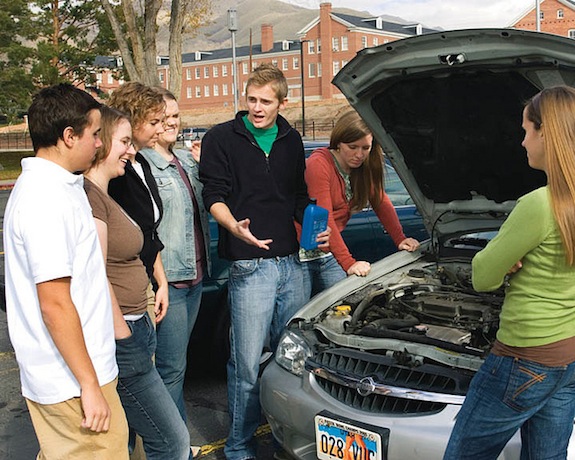The Science Behind Teenager Grunts, Ughs and Duhs
A linguist and editor at The Week, turns monosyllabic grunts into long, fancy, science words

Teenagers! Image: More Good Foundation
Almost everybody gets annoyed, eventually, with teenagers. Parents find them confusing and difficult. Young adults look at them with both scorn and embarrassment. Children find them scary and mean. Even many teenagers hate teenagers.
But not scientists. No, scientists find teenagers fascinating. Take linguists for example. The teenage armory of gasps, grunts, portmanteaus and slang are a linguistic gold mine. Here, James Harbeck, a linguist and editor at The Week, turns monosyllabic grunts into long, fancy, science words:
Many of these linguistic oddities cause older, wiser and more well-spoken generations to decry the teenage voice. They will eagerly denounce the “creaky-voiced long alveolar glide with mid front unrounded vowel and glottal stop”—more commonly known as “vocal fry.” Heaps of scorns have been shoveled onto the even-more-famous “Valley Girl” speak, in which every sentence ends like a question. But what linguistic purists might not realize is that those vocal patterns aren’t designed purely to annoy. They have a particular linguistic function.
“Young women take linguistic features and use them as power tools for building relationships,” linguist Carmen Fought told the New York Times. In fact, according to linguists, young women are the leaders of most linguistic trends, and those trends eventually seep into the general public.
Here’s the New York Times again:
The use of “like” in a sentence, “apparently without meaning or syntactic function, but possibly as emphasis,” has made its way into the Webster’s New World College Dictionary, Fourth Edition — this newspaper’s reference Bible — where the example given is: “It’s, like, hot.” Anyone who has seen a television show featuring the Kardashian sisters will be more than familiar with this usage.
So creaky-voiced long alveolar glide with mid front unrounded vowel and glottal stop might soon find its way into your own linguistic habits. Of course by then the teens will have moved on to something new.
More from Smithsonian.com:
Words from the Dictionary of American Regional English
Say What?
/https://tf-cmsv2-smithsonianmag-media.s3.amazonaws.com/accounts/headshot/Rose-Eveleth-240.jpg)
/https://tf-cmsv2-smithsonianmag-media.s3.amazonaws.com/accounts/headshot/Rose-Eveleth-240.jpg)